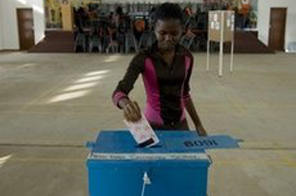Botswana heads to the polls
GABORONE: Botswana voted on Friday in parliamentary elections widely expected to return President Ian Khama's ruling party to power in the diamond-rich nation seen as Africa's most successful democracy.
The poll is the most challenging yet to Khama's ruling Botswana Democratic Party, in power since independence in 1966, which has been wracked by bitter factionalism amid dissatisfaction over his leadership style. Profile: President Ian Khama
While some critics at home lament his authoritarian style, the tough-talking president is popular abroad, most notably for breaking ranks with regional leaders to criticise President Robert Mugabe in neighbouring Zimbabwe.
Failed elections accompanied by political violence and a devastating economic crisis across the border in Zimbabwe stand in sharp contrast to the smooth electoral process in Botswana, expected to be typically peaceful.
"We have not received any complaints of intimidation or whatsoever from any of the political parties," said Francisco Madeira, head of the 88-member Southern African Development Community (SADC) observer mission.
In north-west Gaborone, Malebogo Morakaladi, 36, stood at the back of a queue of about 50 people reading the latest Dan Brown novel while her husband Leonard flips through his own book.
"It is a good way to pass the time," she said, adding that the election had been the most exciting in recent years.
"We saw a lot more debates and people have been a lot more vocal."
While stable, Botswana has been hard-hit by an economic crisis which has eaten into diamond revenues, highlighting the failure of government to diversify the economy and deal with highunemployment and poverty levels.
The diamond industry employs just over 5,000 people in the nation of 1.9 million, and contributes a third of the nation's gross domestic product.
Otsweletse Moupo of the main opposition Botswana National Front hopes to capitalise on dissatisfaction with infighting in the ruling party and socio-economic problems.
Botswana has the world's second-highest burden of AIDS, with one in four adults estimated to be HIV positive, and 47 percent of people live below the poverty line of one dollar a day.
"We have struck a responsive chord in the population. We are confident, maybe not of winning, but of doing relatively well," Moupo told AFP after voting in Gaborone.
He highlighted concerns that the country's democracy was stagnating, saying there were "very worrying" developments under Khama.
These include the introduction of media laws seen as oppressive, increasing reliance of security forces and "strategic placement of soldiers and police officers in civil service positions".
Khama, the 56-year-old son of Botswana's founding father and former defence force chief, who faces his first election after taking over from his retired predecessor last April, shrugs off the dictator label.
"I will not hesitate to fire lazy people because they have no place in my government," he vowed at a rally on Thursday.
Around 725,000 people have registered to vote at 2288 polling stations around the country.
Seven political parties and 15 independent candidates are contesting the country's 57 constituencies - translating into the 57 parliamentary seats with an additional four lawmakers appointed by the president.
The winning party will need 29 seats to name their president with results expected on Saturday.






